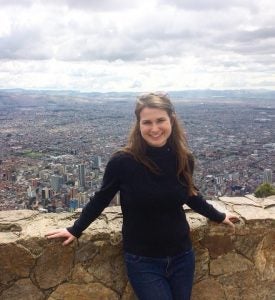Independent Semester Abroad:
University of Los Andes, Colombia

Erin Formby ’20 spent the fall semester of her 3L year pursuing an independent semester abroad at the University of Los Andes in Bogotá, Colombia.
Why did you decide to study abroad?
Before starting law school, I lived and worked in Medellín, Colombia for a year and became interested in the United States’ Latin America policy. At HLS, I wanted to learn about a Latin American civil legal regime and political system, but I found that there were limited opportunities to do so at Harvard. Therefore, I felt that best way to pursue Latin American legal studies was through studying abroad in the region.
I also saw studying abroad in Latin America as an opportunity to further solidify my fluency in Spanish. I have spent time at Harvard working as an ally to the undocumented community through advocacy and pro bono work. No matter which career path I choose, I hope to always provide legal support to immigrant communities, so studying in Spanish for a semester seemed like a great opportunity.
How did you prepare?
I knew from the beginning that I wanted to study in Colombia—the country not only has a warm and amazing culture, but it also has a civil law system with fairly strong legal institutions. My Colombian friends at Harvard were the primary reason why I chose to apply to the University of Los Andes (Uniandes), as some of them had either worked at or completed their undergraduate degrees at Uniandes. They all had great educational experiences there, so I felt confident choosing Uniandes as my study abroad destination.
These friends helped facilitate my study abroad process by putting me in contact with the international office at Uniandes. Uniandes’s international team provided me all of the support I needed for the application process. After I was accepted and before I departed, they also gave me information on housing, visas, courses, and university life in general. I felt incredibly supported throughout the whole preparation process.
What courses did you take?
Upon the advice of a good friend, (an Uniandes alum and Harvard LL.M.), I chose to study three subjects at Uniandes—obligations, constitutional law, and legal theory—which all relate to the civil legal system in different ways.
The most traditional civil law course I took was Obligations. An “obligation” in Colombian law stems from contractual commitments or legal duties which exist due to relationships between “legal” or “natural” people. The course I took focused on Colombian contract law, which is delineated in the Colombian Civil and Commercial Codes. Forming a contract is very different in Colombia than in the United States—while in the United States two individuals can create a contract through scribbling their agreement on a napkin while drinking in a bar (Lucy v. Zehmer), in Colombia there are many different types of contracts that each have their own specific, formal, and rigid requirements.
In addition to Obligations, I took Colombian Constitutional Law and Latin American Legal Theory, both of which included discussions of Colombian legal and political history. It was interesting to learn about how Colombia’s history has so strongly influenced the formation of its legal system and the development of its law, and I enjoyed comparing the context to the United States. All classes were in Spanish, which made the experience even better!
How was the experience?
Overall, I had a great experience at Uniandes and highly recommend it as a study abroad destination. In addition to having great professors, Uniandes has the best staff and support for international students that I could have imagined. The international team really went above and beyond to make sure students had a good experience. For example, there is a group of Colombian students at Uniandes, called Hermanos Sin Fronteras, who organize daily events for exchange students. I spent a lot of time with my fellow study abroad students and the Hermanos. I even traveled with one of the Hermanos to Cali and Bahia Malaga for our vacation week (and highly recommend both destinations!).
How does the semester abroad fit in with your career plans?
After graduation, I will be returning to Bogotá to work with Dejusticia, a Colombian NGO, as a Public Service Venture Fund Fellow. I will be a part of Dejusticia’s international group, where I will work on litigation and advocacy efforts related to migration, climate change, and civil society spaces. After my yearlong fellowship, I plan to pursue a career that focuses broadly on international law and policy, and studying abroad fit in with this path. Specifically, I was able to learn about the application of international law in a foreign jurisdiction, which strengthened my understanding of international law in general.
For example, at Uniandes, I participated in weekly seminars with Colombia’s leading immigration lawyers, where we discussed how Colombia was addressing Venezuelan migration through law and policy. This often included applying international refugee and human rights law to the Venezuelan migration context. Additionally, I was able to attend a conference in Medellín regarding international arbitration in Colombia. I had previously worked on international arbitration matters during summer clerkships, although none of these matters pertained to investments in Latin America. I gained many insights about the relevance of international investment law in Colombia and Latin America as a whole. A comparative understanding of how international law is interpreted and applied will always be invaluable to me.